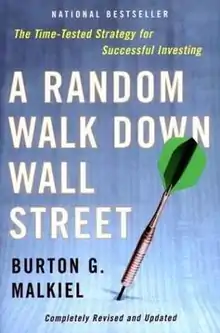A Random Walk Down Wall Street
A Random Walk Down Wall Street, written by Burton Gordon Malkiel, a Princeton economist, is a book on the subject of stock markets which popularized the random walk hypothesis. Malkiel argues that asset prices typically exhibit signs of a random walk and that one cannot consistently outperform market averages. The book is frequently cited by those in favor of the efficient-market hypothesis. As of 2020, there have been twelve editions and over 1.5 million copies sold.[1] A practical popularization is The Random Walk Guide to Investing: Ten Rules for Financial Success.[2]
 | |
| Author | Burton Malkiel |
|---|---|
| Country | United States |
| Language | English |
| Genre | Non-fiction |
| Publisher | W. W. Norton & Company, Inc. |
Publication date | 1973 |
| Pages | 456 pp. |
| ISBN | 0-393-06245-7 |
| OCLC | 72798896 |
| 332.6 22 | |
| LC Class | HG4521 .M284 2007 |
Investing techniques
Malkiel examines some popular investing techniques, including technical analysis and fundamental analysis, in light of academic research studies of these methods. Through detailed analysis, he notes significant flaws in both techniques, concluding that, for most investors, following these methods will produce inferior results compared to passive strategies.
Malkiel has a similar critique for methods of selecting actively managed mutual funds based upon past performances. He cites studies indicating that actively managed mutual funds vary greatly in their success rates over the long term, often underperforming in years following their successes, thereby regressing toward the mean. Malkiel suggests that given the distribution of fund performances, it is statistically unlikely that an average investor would happen to select those few mutual funds which will outperform their benchmark index over the long term.
See also
References
- Burton Malkiel (2011) A random walk down Wall Street: the time-tested strategy for successful investing
- Hardback: ISBN 978-0-393-05854-3, Paperback: ISBN 978-0-393-32639-0
External links
- Une marche au hasard à travers la Bourse, French translation by Éric Pichet.